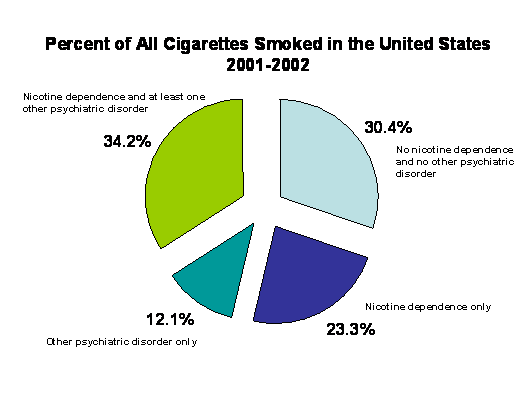Smokers with Psychiatric Disorders including Nicotine Dependence Consume Most U.S. Cigarettes: Findings Raise Questions for Health Professionals, Researchers
Adults with nicotine dependence and/or psychiatric disorders consume 70 percent of all cigarettes smoked in the United States, according to results of a National Institutes of Health (NIH) study reported in the November issue of the Archives of General Psychiatry (Volume 61). Based on the 2001-2002 National Epidemiologic Survey on Alcohol and Related Conditions (NESARC), the article provides the first national estimates among U.S. adults of the prevalence and co-occurrence of nicotine dependence and a broad array of other psychiatric disorders including alcohol and drug abuse and dependence, mood and anxiety disorders, and personality disorders as defined by the American Psychiatric Association's Diagnostic and Statistical Manual of Mental Disorders-Fourth Edition (DSM-IV).
Nicotine dependence is most prevalent among persons with current drug and alcohol use disorders (52.4 percent and 34.5 percent, respectively) and somewhat lower among persons with any mood or anxiety disorder (29.2 percent and 25.3 percent, respectively) and personality disorders (27.3 percent). Persons with a current psychiatric disorder--whether or not they are nicotine dependent--make up 30.3 percent of the population and consume 46.3 percent of all cigarettes smoked. Nicotine dependent persons with co-existing psychiatric disorders comprise only about 7 percent of the adult population but smoke about 34 percent of all cigarettes.
"Until now, surprisingly little has been known about the comorbidity of nicotine dependence and other psychiatric disorders and its role in the national burden of smoking on health," said Ting-Kai Li, M.D., Director of the National Institute on Alcohol Abuse and Alcoholism at NIH. "This report fills that gap and points to a need to focus smoking cessation efforts on persons with nicotine dependence, especially those with co-occurring alcohol and drug use disorders or other comorbid psychiatric conditions."
The NESARC is a representative survey of the U.S. civilian noninstitutionalized population aged 18 years and older. With more than 43,000 adult Americans participating, the NESARC is the largest study ever conducted of the co-occurrence of psychiatric disorders among U.S. adults. Earlier NESARC reports (see 2004 News Releases at www.niaaa.nih.gov) estimate the prevalence of alcohol and drug use disorders, mood and anxiety disorders, personality disorders, and the co-occurrence of alcohol use disorders with other psychiatric diagnoses.
"Whereas previous studies have found elevated smoking rates among persons with psychiatric disorders, ours is the first nationally representative study to address nicotine dependence-a disorder in which repeated consumption results in compulsive use that is often chronic and continues despite serious consequences," says lead author Bridget Grant, Ph.D., Chief, Laboratory of Biometry and Epidemiology, Division of Intramural Clinical and Biological Research, NIAAA.
"The results clearly indicate that smoking prevention and treatment efforts should be developed to target vulnerable subgroups at both the population and the individual levels."
For an interview with Dr. Grant, please contact the NIAAA Press Office (301-443-0595 or 301-443-3860). For a copy of the study, media representatives may contact the NIAAA Press Office or [email protected]. Full text will be accessible to the public at 3:00 PM CT on November 1 at www.archgenpsychiatry.com.


